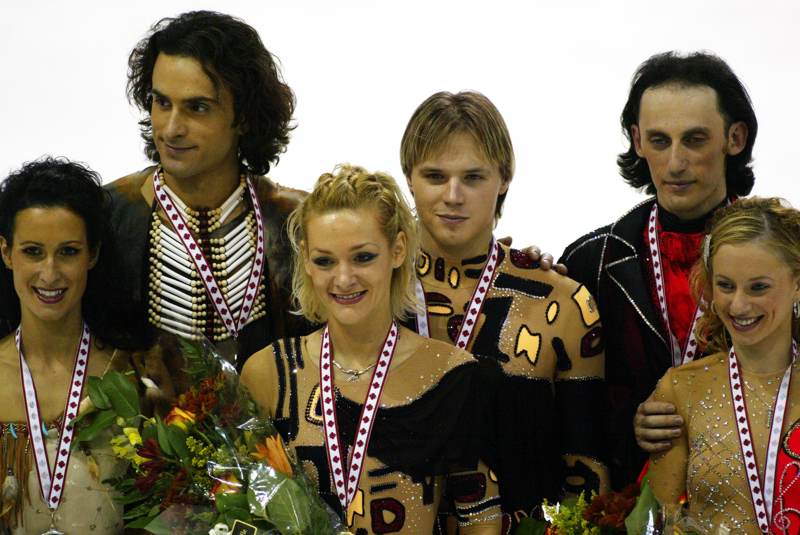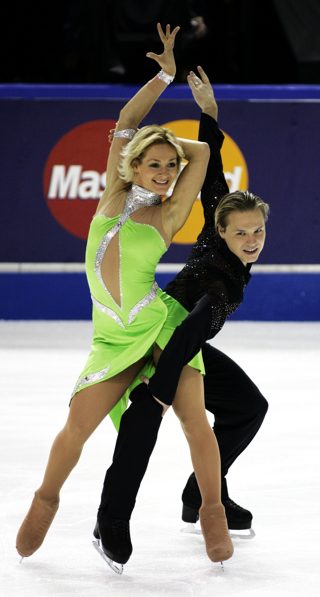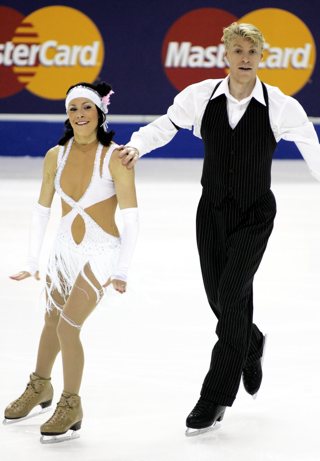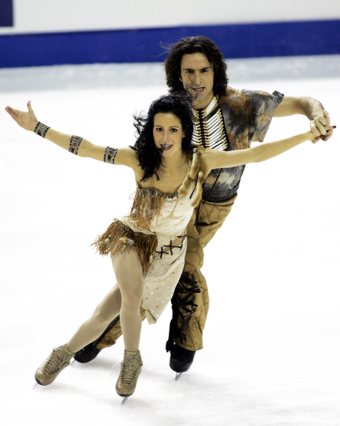|
The 2004 Skate Canada competition opened at the Metro Centre on Thursday, October 27 with compulsory dance with a 12-team field with this year’s assigned dance the Rhumba. This dance is skated in side-by-side Killian position. This dance originated in Cuba This ice dance was first danced in 1938 in London and created for the ice by Walter Gregory. Albena Denkova & Maxim Staviski of Bulgaria lead after the compulsory dance round with a total score of 41.05. The second place team of Isabelle Delobel & Oliver Schoenfelder of France earned a score of 39.37. The Bulgarian has a small lead in the technical score but aced their competition in their program component score. According to Staviski this is the first time they skated the Rhumba under a non-6.0 scoring system. When asked if there was any different preparation or if it felt any different to compete this compulsory dance under the new scoring system he explained, "It is still the same music and the same steps so it didn’t seem any different. We are just happy to have such a good start to this competition." Canada’s own Marie-France Dubreuil & Patrice Lauzon skated a competent compulsory dance for a total score of 39.35, just .02 hundredths less than the French team. Both these teams train at the same rink in France. The Canadians had a higher program component score but lost on the technical score by .48. "That's okay," Dubreuil said. "We train with them every day. We know we're really close with them. We have the same technique almost. We're very confident with our original dance." She described the first competition of the season as the most nerve-wracking but they try to channel that into power on the ice during competitions. "We skated a pretty solid performance,'' added Dubreuil. "In the Rhumba, the patterns are almost all the same, they don't vary that much, so we were worried but the ice was pretty good when we skated." Also still within striking range at this stage is the Israeli team of Galit Chait & Sergei Sakhonovski whose compulsory dance merited a 38.58. The Canadian team beat them in both aspects of this competitive round. Another Canadian team of Megan Wing & Aaron Lowe sits in fifth place with a total score of 35.35. There is currently a close battle for 6th & 7th place between the Russian team of Jana Khoklova & Sergei Novitski with 31.72 points and the new German senior team of Christine & William Beier with 31.48 points (.24 difference in scores) The American team of Loren Galler- Rabinowitz & David Mitchell are in 9th place wit 28.67 points, just slightly behind the Canadian team of Martine Patenaude & Pascal Denis with 28.75 point (.08 difference) |
|||||||||||||||||||||||||||||||||||||||||||
Original Dance
|
This season’s original dance for Skate Canada features ballroom style rhythms and the skaters had a choice of Quickstep, Charleston, and Slow Foxtrot. The leaders after the original dance continue to be the Bulgarian team of Albena Denkova & Maxim Stavinksi. Stavinski said, “I don’t like the ballroom rhythms I prefer the tango and the other Latin rhythms.” Denkova likes the Charleston. This team won this round by a slight edge of .92 points in the combined just original dance scores. She had a noticeable slip in the twizzle section of their level 3 footwork. Their original dance to Big Beat Band (Charleston), “You’ve got a Friend in Me” (Slow Foxtrot) and then returning to Big Beat Band (Charleston). They will skate second in the final group of competitors on Sunday afternoon. Moving up into second place were the Canadian skaters, Marie France Dubreuil & Patrice Lauzon who performed a Gene Kelly inspired original dance to “Singing in the Rain.” They had a higher technical element score (22.0) and seemed to better capture the flavor of the rhythms as did their training mates the French team. The Bulgarian team had a good lead over them from the compulsory dance so the current margin of victory at this competitive stage when combining both round scores was 3.42. “We have wanted to skate to this music for a very long time. It is one of our favorite films.” They choreographed the program themselves with Gene Kelly’s video performance running at the side of the rink. “We tried to match some of the body movements rather than the steps since we needed to include the Slow Foxtrot, Charleston and Quickstep rhythms.” They skate third in the final flight of competitors for the free dance before a home country crowd. This dance had good flow and the crowd gave them a standing ovation. “We had two little misses in synchronization on our footwork but you should see that level rise as we continue to improve this season,” she said. The described the Canadian crowd as amazing. They have been working on building body strength off-ice. “The stronger I get the less he hurts me when we practice,” she said with a smile. Dropping down to third place was their friends and training mates the French team of Isabelle Delobel & Olivier Schoenfelder for their original dance that included "That’s my Baby" (Charleston) and a French song, “Cest si bon” (Slow Foxtrot) and only two different rhythms. They had the highest TE score of 22.60 but lost ground on their total program component score of 37.81, they are just. .03 out of second place in this very close result. They drew to skate first in the final group of the free dance. “This is the first time we skated this program in competition and we had a mistake. I think we skated well for the first time,” she said. He added, “We have been very close for years and that is just fact and we are just .03 apart now. We have the same coach so maybe that is why.” The Israeli team remained in fourth place after this competitive round after skating a strong fast paced performance to This team also competed at Skate America and had just one day to make changes in their program. “We listened to the judges and tried to make the changes they suggested. We have a totally different spin for example.” They will be the final competitors of Skate Canada. They skated to music by Benny Goodman and Nat King Cole. Their two quickstep segments utilized “Sing, Sing, Sing” and skated to “Smile” for their slow foxtrot. This team finished .99 points behind the French and way ahead of the Canadian competitors in 5th place, Megan Lowe & Aaron Lowe (86.12) in the original dance segment. They currently sit just .20 behind the French when both dance scores are combined. So this free dance could be an open battle for the medals among the top four teams. The American team of Loren Galler-Rabinowitz & David Mitchell remained in 9th place after both competitive phases. She had a new red dress since Skate America and they also changed one of their lifts completely since that event for a higher level and made some other changes suggested by the judges at Skate America. This team competes early, third in the first group of competitors. “Instead of a combination lift we now have a reverse rotation lift. I am also thrilled to be skating to music by Frank Sinatra,” he said. They skated the slow foxtrot rhythm to “World on a String” sung by Sinatra and used “Lover’s Lane” for the Charleston. |
|||||||||||||||||||||||||||||||||||||||||||
Free Dance
|
The winners throughout the first two phases, the Bulgarian team of Albena Denkova & Maxim Staviski, continued to victory as the 2004 Skate Canada champion which earned them 12 points in the Grand Prix series. Their free dance to “Bach to Africa” by Labarena and Bach was a tribute to members of the African culture. This program was very busy with a lot to take in on a first viewing. They covered the ice well. "We will try to make all elements the highest level," said Staviski. According to Denkova, they are showing their interpretation of the African culture with this dance. Their margin of victory over the Canadian team was a difference of 5.24 in total points. Staviski said at the ice dance press conference, "We skated good. I made a small mistake but it was a good performance. The public liked our program. Happy to get our first gold medal at Skate Canada after seven times participation." His partner missed the press conference because she was in doping control. As the champions they took home $18,000.00 USD in prize money. The Canadian team of Marie France Dubreuil & Patrice Lauzon took home the silver medal for their “Winter Vision” by Scott Fitzgerald & “Taboo” by Peter Gabriel. Their program was about the lives of Native Americans according to the couple. She said, “We are very happy with our performance. Our main goal was to succeed with every element. It was a good confidence boost for the rest of the season.” Their prize money totaled $13,000.00 USD. Their program had several strong lift and spin highlights but their ice coverage could be improved. Dubreuil said, “The hardest thing to define to be level four is the foot work. It is still hard for the callers to identify the steps.” The Canadians finished ahead of the Israeli team by 2.52 points overall. The Israeli team of Galit Chait & Sergei Sakhnovski skated with speed and had increased their difficulty since Skate America. Chait said, “We are very happy with our medal and we are very happy that we skated two competitions (Skate America and Skate Canada) clean. We are also happy with have almost all level four (elements) here.” Their shoot the duck type lift for the straight-line lift was a crowd pleaser. Their program flowed well and this was a strong performance for this team as the skated to Bach’s “Toccata and Fugue in D minor. According to Chait, it tells the story of their skating career in their free dance. The French team of Isobelle Delobel & Olivier Schoenfelder skated to music from “Frida” soundtrack by Elliot Goldenthal. During their Serpentine lift when they changed positions he struggled not to drop her so their lift exit was extremely rough which cost them in points with primarily –2 deductions. The finished behind the Israelis by 2.76 in the free dance and a total point difference of .78 was the difference between a bronze medal or not and winning $9,000 versus $3,000 USD in prize money. The Israeli team also had much more speed. The American team of Loren Galler-Rabinowitz & David Mitchell struggled and suffered two mistakes today in their program to “Phytandros” by Saint Preux. “It was just not our day,” said Mitchell. She slipped first on a twizzle and then another slip on the clockwise circular step sequence, their sixth of eleven elements. They dropped to 10th place in the free skate but maintained their position of 9th overall. They had hoped to catch the other Canadian team but that was not to be. They are one of the younger teams here and the only dance team from the United States.
This team will now turn their attention to the U.S. championships since their Grand Prix series events were back to back the past two weeks. “That makes it hard to learn from your first event and fix things for your second event,” she said. They had one day to make costume and program changes between Skate America and Skate Canada. “We did fine on the elements we changed,” said her partner. |
|||||||||||||||||||||||||||||||||||||||||||
2004 Skate Canada Dance Medalists
|
 |


